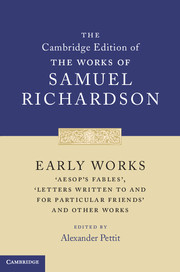Book contents
- Frontmatter
- Dedication
- Contents
- General Editors’ Preface
- Acknowledgements
- Chronology
- List of Abbreviations
- General Introduction
- Textual Introduction
- The Apprentice’s Vade Mecum (1733)
- A Seasonable Examination of the Pleas and Pretensions (1735)
- Preface to Aubin, A Collection of Entertaining Histories and Novels (1739)
- Aesop’s Fables (1739)
- Letters Written to and for Particular Friends (1741)
- Six Original Letters Upon Duelling (1765)
- Appendix: The Infidel Convicted (1731)
- Postscript
- Emendations
- Word-division
- Bibliographical Descriptions of Early Editions
- Explanatory Notes
- Index
Letter CLXVI
Published online by Cambridge University Press: 30 June 2022
- Frontmatter
- Dedication
- Contents
- General Editors’ Preface
- Acknowledgements
- Chronology
- List of Abbreviations
- General Introduction
- Textual Introduction
- The Apprentice’s Vade Mecum (1733)
- A Seasonable Examination of the Pleas and Pretensions (1735)
- Preface to Aubin, A Collection of Entertaining Histories and Novels (1739)
- Aesop’s Fables (1739)
- Letters Written to and for Particular Friends (1741)
- Six Original Letters Upon Duelling (1765)
- Appendix: The Infidel Convicted (1731)
- Postscript
- Emendations
- Word-division
- Bibliographical Descriptions of Early Editions
- Explanatory Notes
- Index
Summary
From a Lady to her false Lover, who after having brav’d all his Friends Expostulations, at last is persuaded to abandon her for another of larger Fortune.
SIR,
’Tis a poor, a very poor Pretence that you make, after what has passed between us, that you must, in Compliance with the Commands of your Friends, break off Acquaintance with me! How often have I advised you to this formerly! How often have you vow’d the Impossibility of your doing it? How have you, in pursuance of this Avowal, brav’d your Friends, and defy’d their Resentments, in such a manner, that gave them no Hope of succeeding with you! tho’ I always blam’d your disobliging way of doing it, in regard to them, as your Relations. But just as you had brought them to expect you would not be prevail’d upon, and they had so far acquiesced in your Choice, that I had received and returned Visits from the Principals of your Family, for you poorly to plead their Menaces, is such a Jest, as is not to be received without Contempt and Indignation.
Well, I can guess at your Motives!—tho’ you are too mean-spirited to acknowledge them, and that they are too mean to be acknowledged. Miss Holles can explain them all, by the Help of a larger Fortune than I have! I have heard of your Uncle's Proposal, and your Visit there.—Go on, Sir, and welcome! I have Spirit enough to despise the Man that could deceive me.—But could you not, for your own sake act this perfidious Part in a more manly and more worthy manner? Could you not find a better Reason than one you had always rejected, when it was more your Duty to observe it? But must you, when your Vows to me had made it your Duty to dispense with it, then shew your Levity in adhering to it? Yet why do I expostulate with a Person so little deserving Expostulation? You may think me angry, because of my Disappointment. ‘Tis true, it is a Disappointment, and I had a better Opinion of you than this Conduct shews you deserved; or Things should never have proceeded so far as they did. But ‘tis a Disappointment, I hope, (tho’ no Thanks to any Part of your Conduct, but your Meanness)1I shall soon get over.
- Type
- Chapter
- Information
- Early Works'Aesop's Fables', 'Letters Written to and for Particular Friends' and Other Works, pp. 513 - 514Publisher: Cambridge University PressPrint publication year: 2011

